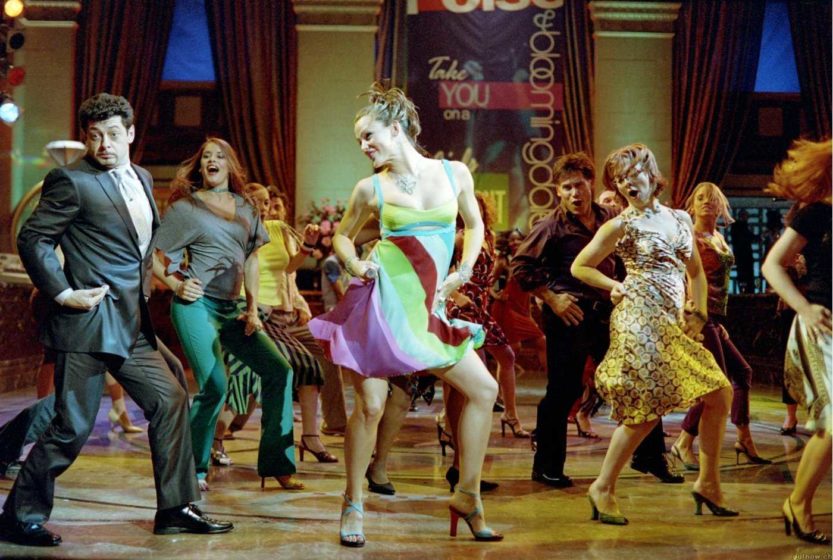In an age where real life romance seems to consist of taking off a face mask to kiss, let us take a moment to remember the hands down most misleading and at times outright disturbing romantic comedy of the past decades, 13 Going on 30.
The premise of the film is just a gender swapped version of Big. After a disastrous 13th birthday in which is she’s tricked into kissing a mildly unpopular boy (unpopular seemingly because his taste in music is too good) Jenna Rink (Jennifer Gardner) wishes to wake up “Thirty, flirty in fabulous.”
And she does! She wakes up in Jennifer Garner’s body. She lives in a swank Gramercy Park apartment. She has a best friend and co-editor Lucy (Judy Greer) who is either a very good friend for patiently explaining how cell phones work to her, or a very bad friend for not assuming that her friend who has forgotten cell phones exist has had a stroke and needs to go to the hospital. She’s the editor of Poise, her favorite magazine. She has a handsome hockey player boyfriend.
13 Going on 30 is very unsurprisingly written in pre-recession 2004, before people began expecting to graduate without any jobs, let alone jobs that seem to pay for a an extremely glamorous lifestyle. Jenna keeps going on shopping sprees at Chanel. Given that many magazine editors make maybe 75K a year, I assume she has massive credit card debt that’s just never brought up.
“Insanely large apartments that people could never afford” are a staple of basically all 2000 era films, but this one really feels like it came from someone who either does not know ay real estate costs, or anything about any editors.
If it’s the latter, it would explain how this film plays out.
Jenna decides to save the magazine by staging a high school yearbook photoshoot with non- famous people, like “my best friend’s sister, and next door neighbor”. Because if there is one thing people want when they buy a magazine, it is to see total strangers pretending to attend a football game. Everyone gets excited about this version of the magazine because the alternative is, I kid you not, Judy Greer’s pitch where the magazine showcases a series of articles about suicide and a “hanging baby.” Strangers in high school outfits or slaughtered infants. Those were the only two options anyone could come up with.
I guess this is finally insight into how the glossy magazine industry died.
In other news, Judy Greer’s character in this is an extremely interesting person who is maybe secretly a serial killer (based on her magazine ideas). Alas, instead of spending a bunch of time with her, Jennifer Garner’s character befriends a group of 13 year old girls who live in her building, whose parents are remarkably incurious about why this strange 30 year old woman is having slumber parties with their daughters.
But it’s not all business. A major part of the movie is comprised of dance numbers set to Michael Jackson’s Thriller. Now, again, this film is from 2004. It was made at a time when listening to Michael Jackson was, at least, less problematic. Still, if it calls to mind predatory behavior towards children, that makes sense, because that is a current running through this whole film.
At least half an hour of the film is about whether or not a woman who is essentially a child will have sex with a number of adult men. At one point, Jennifer Garner is told that a man at a restaurant is checking her out. Rather than going over to flirt with him, she asks out a 13 year old boy at the next table. It is clearly supposed to be a joke, but also, extremely disturbing. But then, it also would have been very disturbing if this child-mind in an adult body had hooked up with an adult man! This is honestly the most unnerving part of Big, as well. I guess there’s supposed to be a loophole because these children have adult bodies, but if you meet someone who keeps insisting they are a child in an adult body, maybe do not unhesitatingly have sex with them.
That’s the main thing that kills me about 13 Going on 30. One of the chief pleasures of adulthood for many people is finally being able to have sex in their own bed without worrying about their parents coming home. No such pleasure can exist in this version of adulthood without being at least a bit weird. That leaves only money, which exists in plentiful degrees in this movie… but not for pretty much anyone who graduated after this movie was made. And to be clear, there is very little pleasure in adulthood in this movie that is not buoyed by an endless supply of money.
What viewers are left with is an extremely skewed version of adulthood where the best pleasure seems to be found in reminiscing about high school football games and dances. That is not a romantic comedy, that is a tragedy. For a lot of us, the pleasures of early adulthood are more nuanced — friendship with roommates, and late nights with friends and reciprocated crushes that have little to do with a candy colored capitalist fantasy. But then, those are things you realize when you mercifully cease to be 13.
This guest post on the Agape Match Blog was written by Jennifer Wright.
Jennifer Wright is an author and political editor-at-large for Harper’s Bazaar. Her pop history books include ‘It Ended Badly: 13 of the Worst Break-Ups in History,’ the Audible bestseller ‘Get Well Soon: History’s Worst Plagues and The Heroes That Fought Them,’ and ‘We Came First: Romantic Advice From Women Who Have Been There.’ Her work can be seen in places like The New York Times, The New York Post, The New York Observer, Time Out New York, and some other publications that don’t have “New York” in the title. You can follow her on Twitter @JenAshleyWright.




